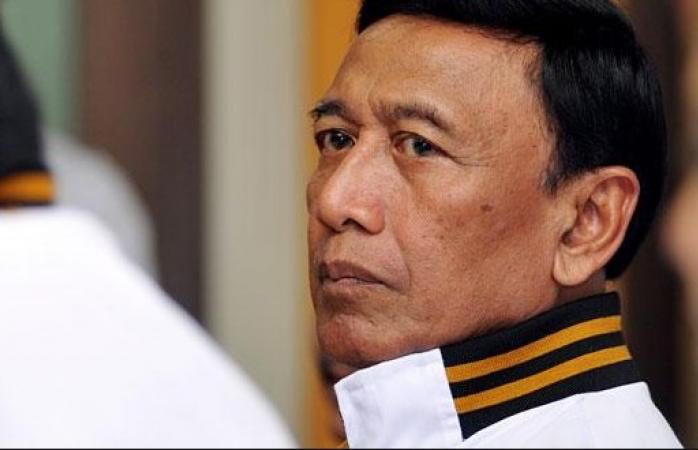The appointment of a war criminal and broader cabinet shake-up is the latest in a series of hardline decisions by President Jokowi. But will it backfire?
Indonesia President Joko Widodo’s recent announcement of his new cabinet line-up aroused two responses.
The first was howls of outrage that former defence chief and alleged human rights abuser Wiranto had been appointed as Coordinating Minister for Political, Legal and Security Affairs, the third most powerful position in government. The second was that Widodo, popularly known as ‘Jokowi’, needed to re-energise his cabinet to better respond to Indonesia’s lagging economy.
Wiranto’s appointment was particularly controversial among human rights activists given he was indicted in 2003 by UN prosecutors for crimes against humanity in relation to military-led atrocities in Timor-Leste in 1999. Wiranto was then head of the Indonesian military and had a direct line of responsibility for events in Timor-Leste, in which at least 1,400 and up to 3,000 civilians were murdered, more than 200,000 forcibly deported to West Timor, and approximately 70 per cent of the then territory’s infrastructure destroyed.
Despite being indicted, Indonesian governments since then have made clear that Wiranto would not be sent to stand trial for the alleged crimes. This has then raised related concern about Indonesia’s culture of impunity for human rights violations.
Wiranto’s appointment was also widely seen as a step to halt further investigations into anti-communist massacres in Indonesia in the mid-1960s. In April, his predecessor, Luhut Pandjaitan, held Indonesia’s first ‘symposium’ to discuss the events of 1965-66.
The symposium was followed by the International Peoples’ Tribunal in The Hague, which in late July found that the Indonesian state was responsible for crimes against humanity over the killings and related persecutions, in which an estimated half a million people were killed. Indonesian governments have been deeply reluctant to acknowledge, much less investigate, the events of the mid-1960s, and Wiranto’s appointment can in large part be seen as ending further official discussion on the subject.
Despite being portrayed externally as a human rights violator, Wiranto’s standing within Indonesia is positive. Few people discuss the events of 1965-66, with most being either strongly anti-communist, wanting to put those memories behind them, or fearful of suspicion of communist sympathy.
Further, within Indonesia, Wiranto is not only not regarded as not being responsible for events in Timor-Leste in 1999 – that has been fictitiously portrayed as violence between ‘rival factions’ – those few Indonesians who do think about it believe that Timor-Leste was taken from Indonesia by force and that resistance was appropriate.
Moreover, as a public political actor, Wiranto was directly involved in getting then President Suharto to step down after more than three decades in power, and a relatively smooth transition towards a more open and democratic political process. Wiranto also previously held the post of Coordinating Political, Legal and Security Minister under President Abdurrahman Wahid.
Critics note that Jokowi’s appointment of Wiranto is just the latest in a series of hardline decisions, including appointing other former military officers to ministerial posts and proceeding with another round of executions for drug offences. This hardline turn has disappointed many of Jokowi’s original supporters, who believed he would be more rather than less of a reformist than his presidential predecessor, Susilo Bambang Yudhoyono.
In part, Jokowi’s hardline position is aimed at maintaining support from the nationalist Indonesian Democratic Party-Struggle, which he nominally represents, as well as other conservative factions within the legislature. The wider Cabinet shake-up also re-balances party representation, intended to ensure continued legislative support for Jokowi’s program.
Publically, however, the main purpose of the changes to cabinet is to reinvigorate Indonesia’s lagging economy and to reduce unemployment. To this end, Jokowi appointed World Bank Managing Director Sri Mulyani Indrawati as the new finance minister, a post she held under Yudhoyono from 2005-10.
As former finance minister, Sri Mulyani instigated far-reaching reforms in the corruption-riddled tax office and cracked down on fraud and corruption in other sectors of the economy. This reformist push ultimately earned her a string of powerful enemies, ending her previous political career.
In a speech just prior to leaving Indonesia for the World Bank, Sri Mulyani said: ‘I’ll be back’. She now is.
Luhut Pandjaitan, who was replaced by Wiranto, was moved to become coordinating maritime affairs minister, in turn replacing sacked maritime affairs minister Rizal Ramli. Others replaced were energy and mineral resources minister Sudirman Said and transportation minister Ignasius Jonan, all of whom disagreed in public with government policy.
Surdiman’s replacement, Archandra Tahar, comes from a senior hydrocarbon engineering background and has been tasked with re-invigorating Indonesia’s failing oil and gas sector, which has fallen to less than half of its 1994 capacity. Indonesia was once a net oil exporter but, with ageing infrastructure, has been reliant on oil imports since 2004.
In all, Jokowi’s second Cabinet reshuffle saw the appointment of 12 new ministers. Jokowi said the new Cabinet was intended to work more solidly and in a more unified way than its predecessor.
Given that Wiranto was inclined to running Abdurrahman Wahid’s Cabinet meetings tightly and efficiently, as though he was its chair rather than the president, and the current president is proving to be weak and directionless, Jokowi may well get at least some of his wish fulfilled.
Damien Kingsbury is Professor of International Politics at Deakin University, and author and editor of a number of books on Indonesian politics and security issues.
 Facebook
Facebook  Twitter
Twitter  Soundcloud
Soundcloud  Youtube
Youtube  Rss
Rss 